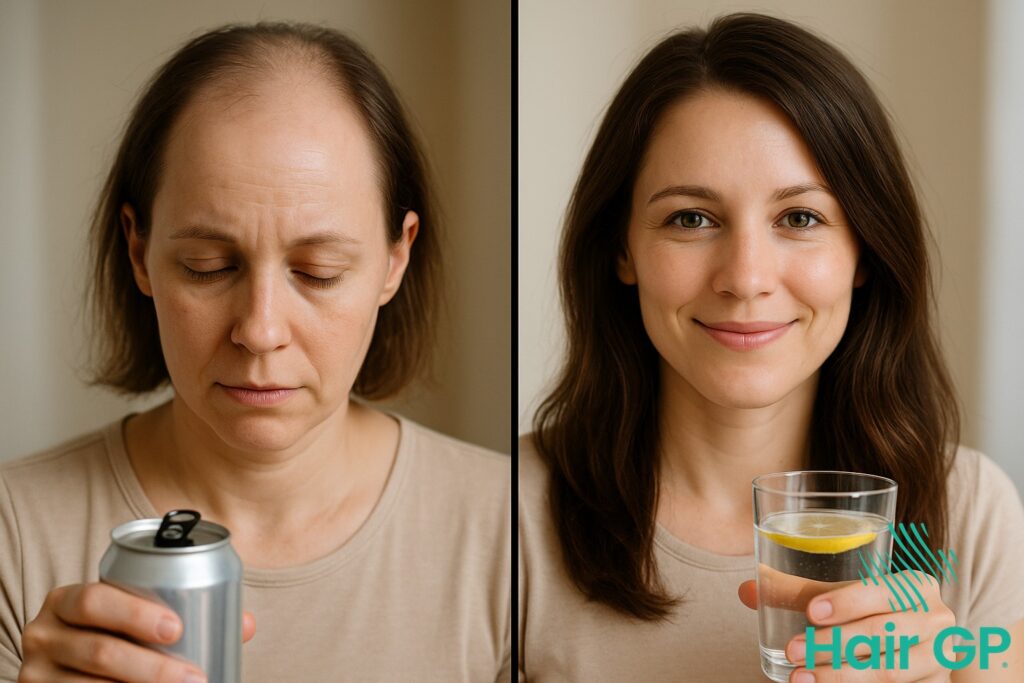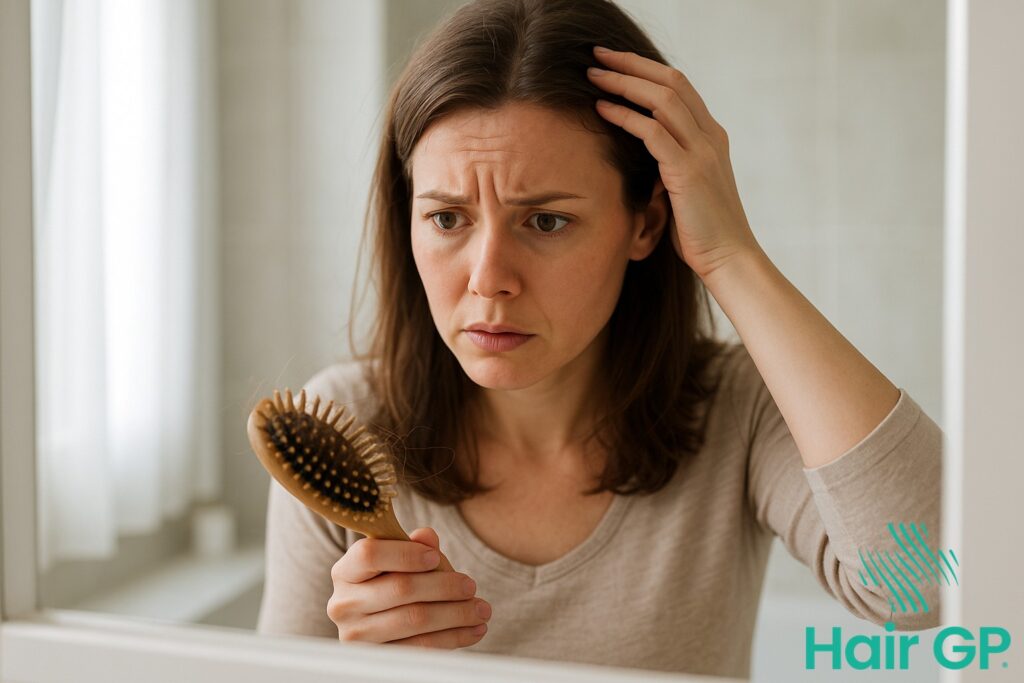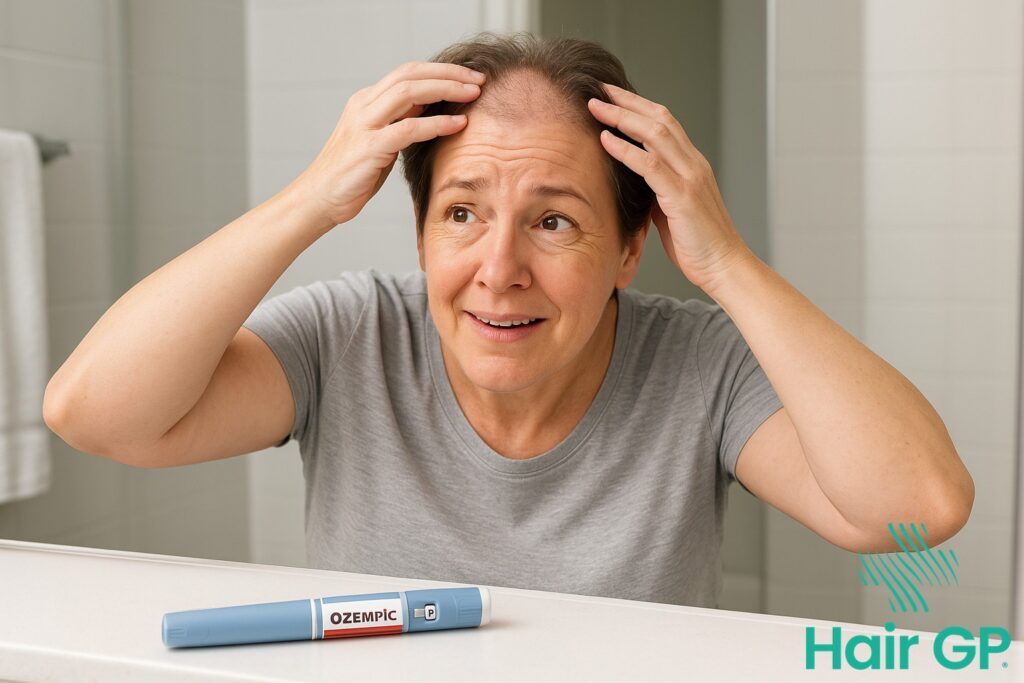Introduction
The connection between hair loss and artificial sweeteners has become an increasingly important topic as millions consume diet products daily. Whilst many reach for sugar-free alternatives to manage weight and blood sugar levels, emerging evidence suggests that non nutritive sweeteners, particularly aspartame, may have unintended consequences for hair health.
If you’ve noticed increased hair thinning whilst regularly consuming diet sodas or sugar-free products, you’re not alone. The relationship between aspartame hair loss and dietary choices reveals how seemingly harmless ingredients might disrupt normal hair growth cycles, potentially triggering conditions like telogen effluvium or accelerating existing hair loss patterns.
This comprehensive guide explores the science behind how artificial sweeteners affect hair follicles, examines different types of hair loss linked to sweetener consumption, and compares various alternatives beyond aspartame. We’ll also delve into the crucial role of diet and hair loss prevention, offering natural sweetening options that won’t compromise your hair health. Finally, we’ll provide evidence-based treatment strategies for those experiencing sweetener-related hair loss, helping you make informed decisions about your dietary choices and hair care.
Key Takeaways – TL/DR
- Aspartame consumption may disrupt amino acid metabolism, potentially affecting hair follicle health and hair growth cycles
- Studies suggest artificial sweeteners can trigger oxidative stress and inflammation that may damage hair follicles
- Eliminating aspartame and switching to natural alternatives may help prevent hair loss in sensitive individuals
- A balanced diet rich in nutrients supports healthy hair growth better than relying on artificial sweeteners
- Individual sensitivity to aspartame varies; monitoring hair health after dietary changes can reveal personal triggers
Understanding Aspartame: The Low-Calorie Artificial Sweetener
Aspartame stands as one of the most widely used low calorie artificial sweeteners globally, offering sweetness approximately 200 times greater than traditional sugar. This synthetic compound consists of two naturally occurring amino acids—aspartic acid and phenylalanine—joined by a methyl ester bond [1]. Discovered in 1965 and approved for use in the 1980s, aspartame has become a cornerstone ingredient in the modern food industry’s efforts to reduce caloric content whilst maintaining palatability.
The prevalence of aspartame in contemporary food products is remarkable, with this artificial sweetener found in over 6,000 products worldwide, including diet sodas, sugar-free chewing gum, yoghurts, and table-top sweeteners [2]. Unlike sugar sweetened beverages that contribute significant calories, aspartame-containing alternatives provide virtually no caloric value. Upon consumption, aspartame undergoes rapid hydrolysis in the small intestine, breaking down into its constituent components: aspartic acid (40%), phenylalanine (50%), and methanol (10%). These metabolites then enter normal biochemical pathways, with aspartic acid and phenylalanine being metabolised as amino acids, whilst methanol is converted to formaldehyde and subsequently formic acid. This metabolic process occurs swiftly, with complete breakdown typically occurring within hours of ingestion.
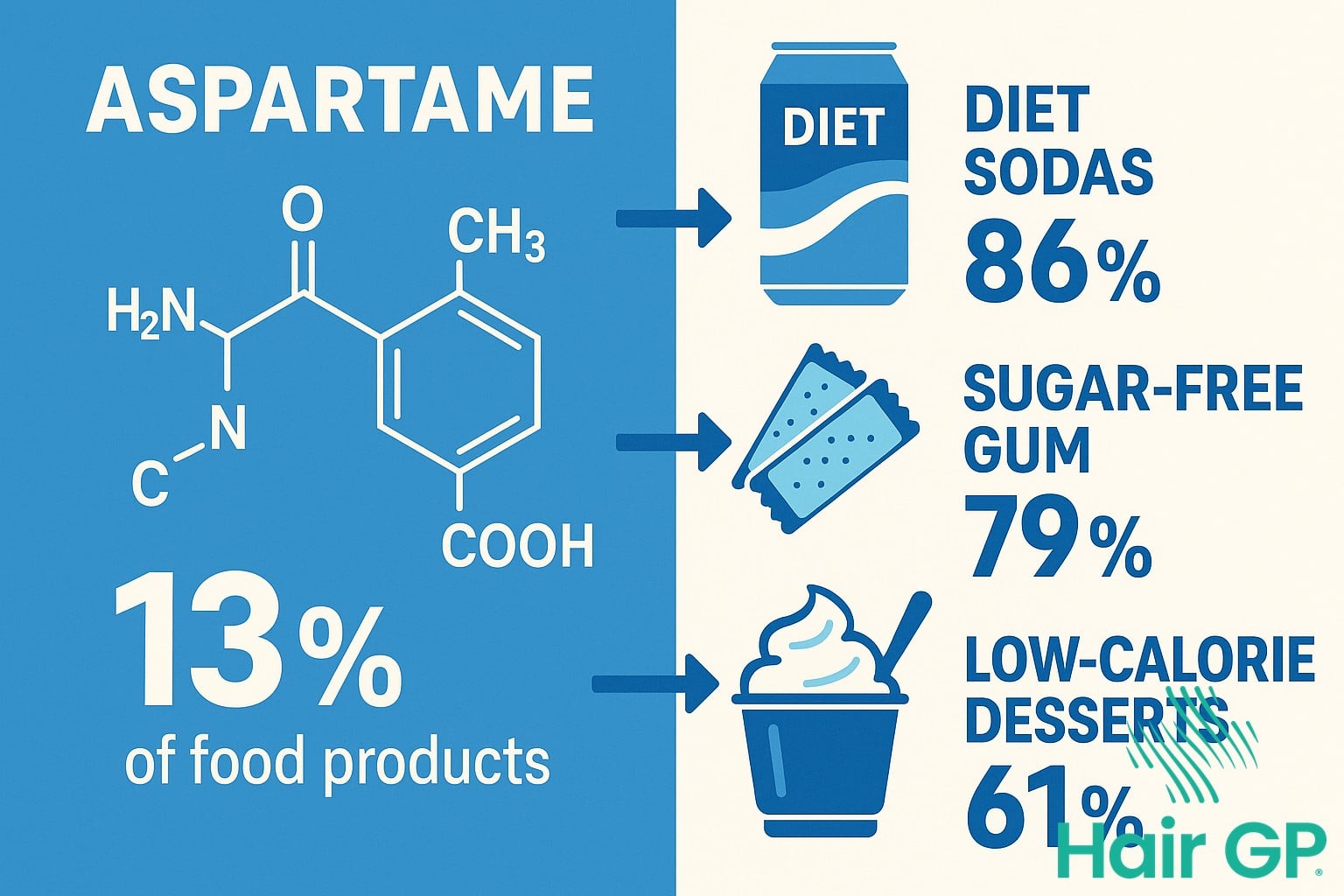
The Science Behind Aspartame and Hair Loss
Aspartame metabolism produces compounds that may interfere with hair follicle function through multiple biological pathways. When consumed, aspartame breaks down into phenylalanine, aspartic acid, and methanol, creating metabolic byproducts that can disrupt amino acid balance, increase oxidative stress, and trigger scalp inflammation—all factors that contribute to conditions like telogen effluvium and compromised hair growth cycles.
Oxidative Stress and Hair Follicle Damage
Research indicates that aspartame metabolites generate free radicals that can damage hair follicles at the cellular level [3]. When methanol from aspartame converts to formaldehyde and formic acid, these compounds create oxidative stress that depletes antioxidants in scalp tissue. This oxidative damage particularly affects hair matrix cells, the rapidly dividing cells responsible for hair shaft production. Studies have shown increased markers of oxidative stress in regular consumers of artificial sweeteners, including elevated lipid peroxidation and reduced glutathione levels [4]. This cellular damage can push hair follicles prematurely into the telogen (resting) phase, leading to increased shedding in those experiencing hair loss from aspartame consumption.
Amino Acid Imbalances and Hair Production
Aspartame’s high phenylalanine content disrupts normal amino acid transport across cell membranes, creating competition with other essential amino acids needed for protein synthesis. This imbalance directly impacts keratin production, the primary structural protein in hair. When phenylalanine levels become excessive, they interfere with tyrosine metabolism, reducing melanin production and weakening hair structure. Additionally, the disruption of tryptophan transport affects serotonin synthesis, which plays a role in regulating hair growth cycles. These amino acid imbalances can manifest as brittle, thinning hair and may contribute to aspartame hair loss patterns observed in regular consumers.
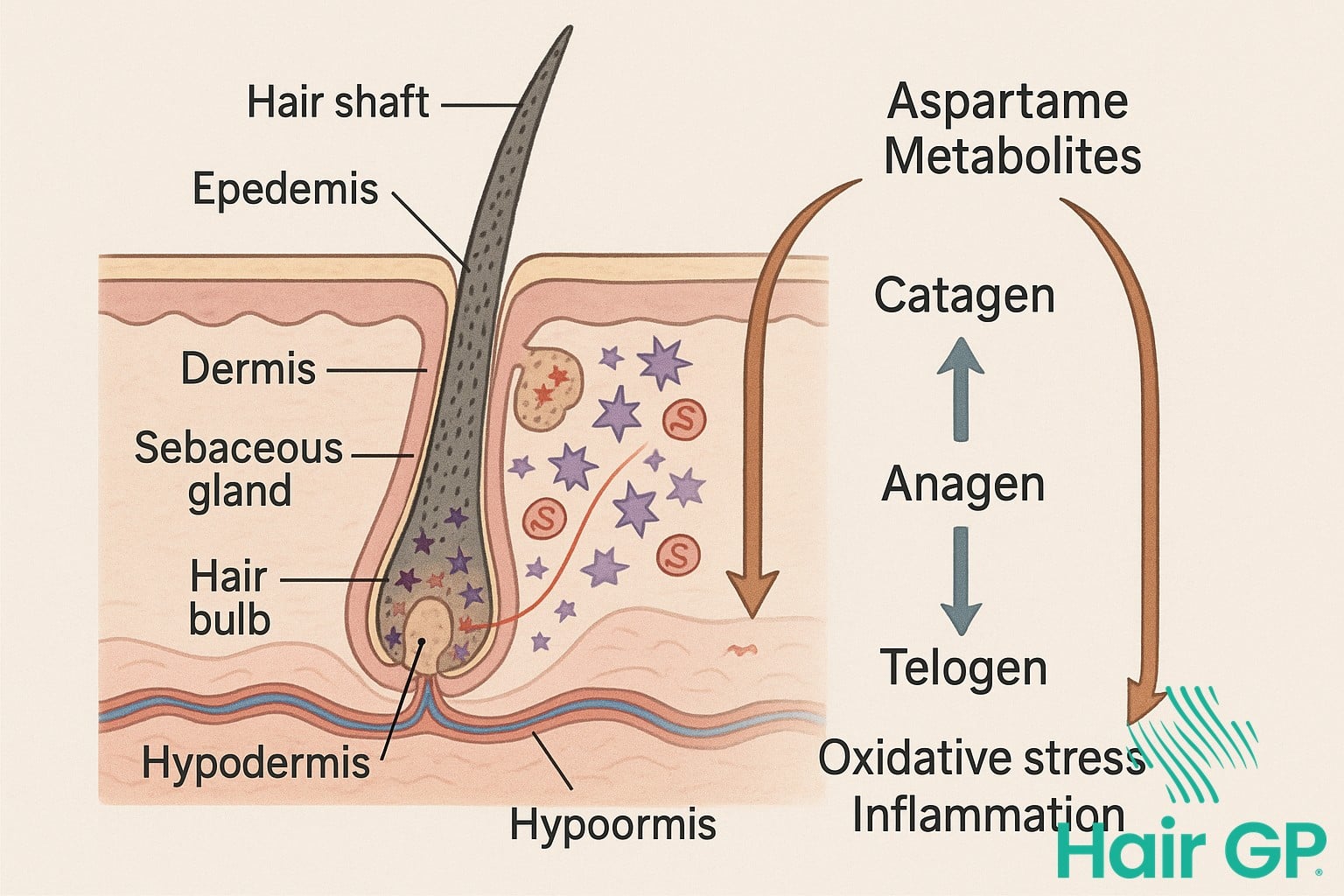
Types of Hair Loss Linked to Artificial Sweetener Consumption
Artificial sweetener consumption may trigger or exacerbate several distinct forms of hair loss, with aspartame showing particular associations with disrupted hair growth cycles. Understanding these connections helps individuals identify whether their thinning hair might be linked to dietary choices and provides insight into potential reversibility through nutritional modifications.
Telogen Effluvium and Dietary Triggers
Artificial sweeteners can potentially induce telogen effluvium by creating metabolic stress that prematurely pushes hair follicles into their resting phase. This condition manifests as diffuse hair shedding across the scalp, typically occurring 2-3 months after the triggering event. The stress response from aspartame metabolism may disrupt normal hair growth cycles, causing synchronised follicular rest periods[1]. Fortunately, this form of hair loss often reverses within 6-9 months following dietary changes and sweetener elimination.
Accelerated Pattern Hair Loss
Whilst artificial sweeteners cannot cause androgenetic alopecia directly, emerging evidence suggests they may accelerate male pattern hair loss in genetically predisposed individuals. The inflammatory response triggered by aspartame consumption can enhance DHT sensitivity in susceptible follicles[2]. This inflammation-mediated progression appears more pronounced in men than women, potentially due to hormonal interactions that affect hair loss severity. Additionally, some individuals with alopecia areata report increased patch development during periods of high artificial sweetener intake, though this connection requires further investigation.
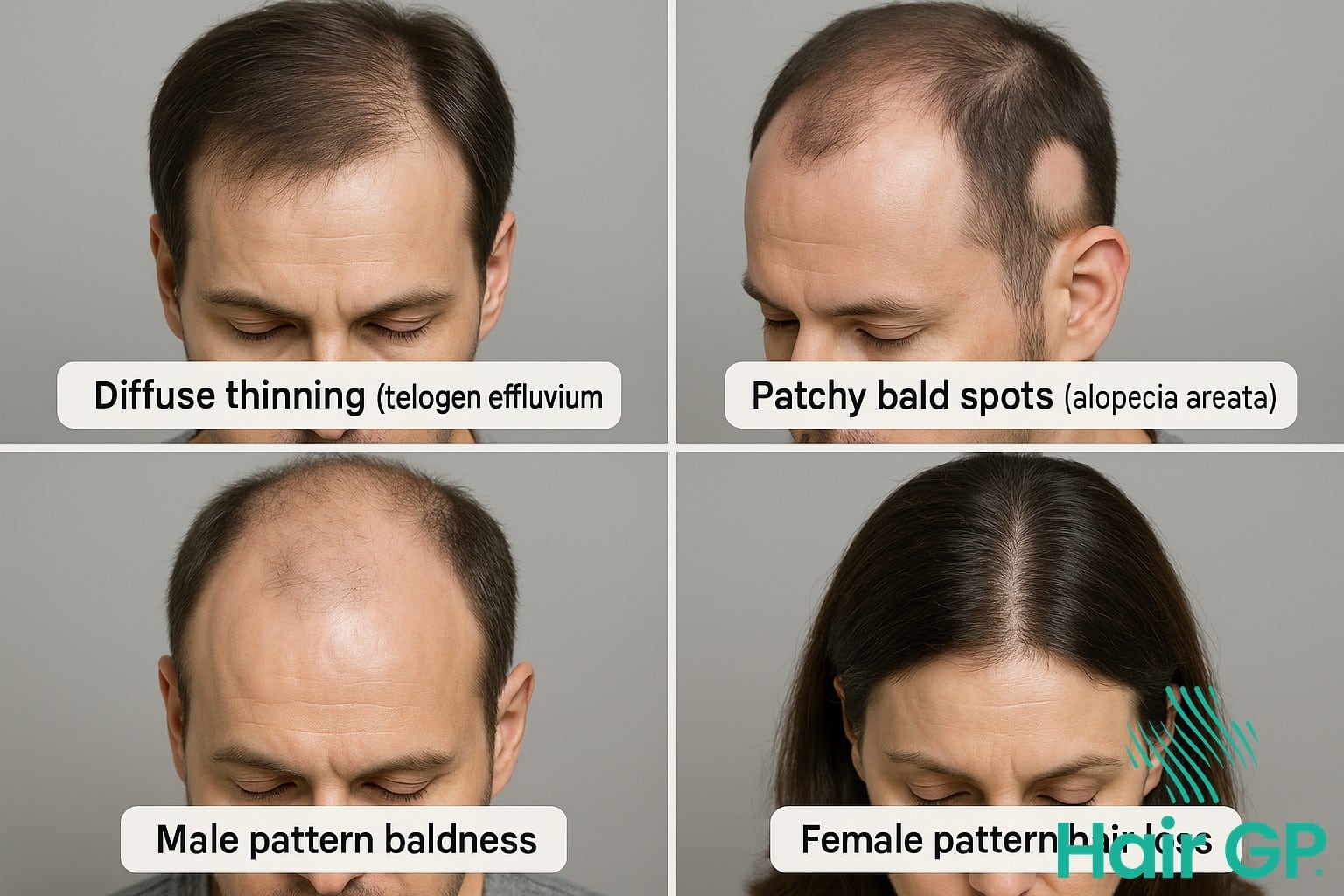
Beyond Aspartame: Other Artificial Sweeteners and Hair Health
Whilst aspartame remains the most studied of artificial sweeteners, several other non nutritive sweeteners warrant examination regarding their potential impact on hair health. Sucralose, discovered in 1976, passes through the body largely unmetabolised, with approximately 85% excreted unchanged. Unlike aspartame, sucralose maintains stability at high temperatures, making it suitable for cooking applications. Saccharin, the oldest artificial sweetener dating to 1879, similarly demonstrates minimal metabolic activity, though some studies suggest potential interactions with gut microbiota that could indirectly influence nutrient absorption patterns relevant to hair follicle health.
Sugar alcohols such as xylitol and erythritol occupy a middle ground between sugar and synthetic sweeteners, providing fewer calories whilst maintaining some metabolic activity. These compounds undergo partial absorption in the small intestine, potentially offering different physiological effects compared to completely non-caloric alternatives. Natural alternatives like stevia, derived from Stevia rebaudiana leaves, contain steviol glycosides that provide sweetness without calories. Emerging research suggests stevia may possess antioxidant properties that could theoretically support hair health, though direct evidence remains limited. The choice between artificial and natural sweeteners ultimately depends on individual tolerance, metabolic considerations, and overall dietary patterns that influence hair follicle nutrition.
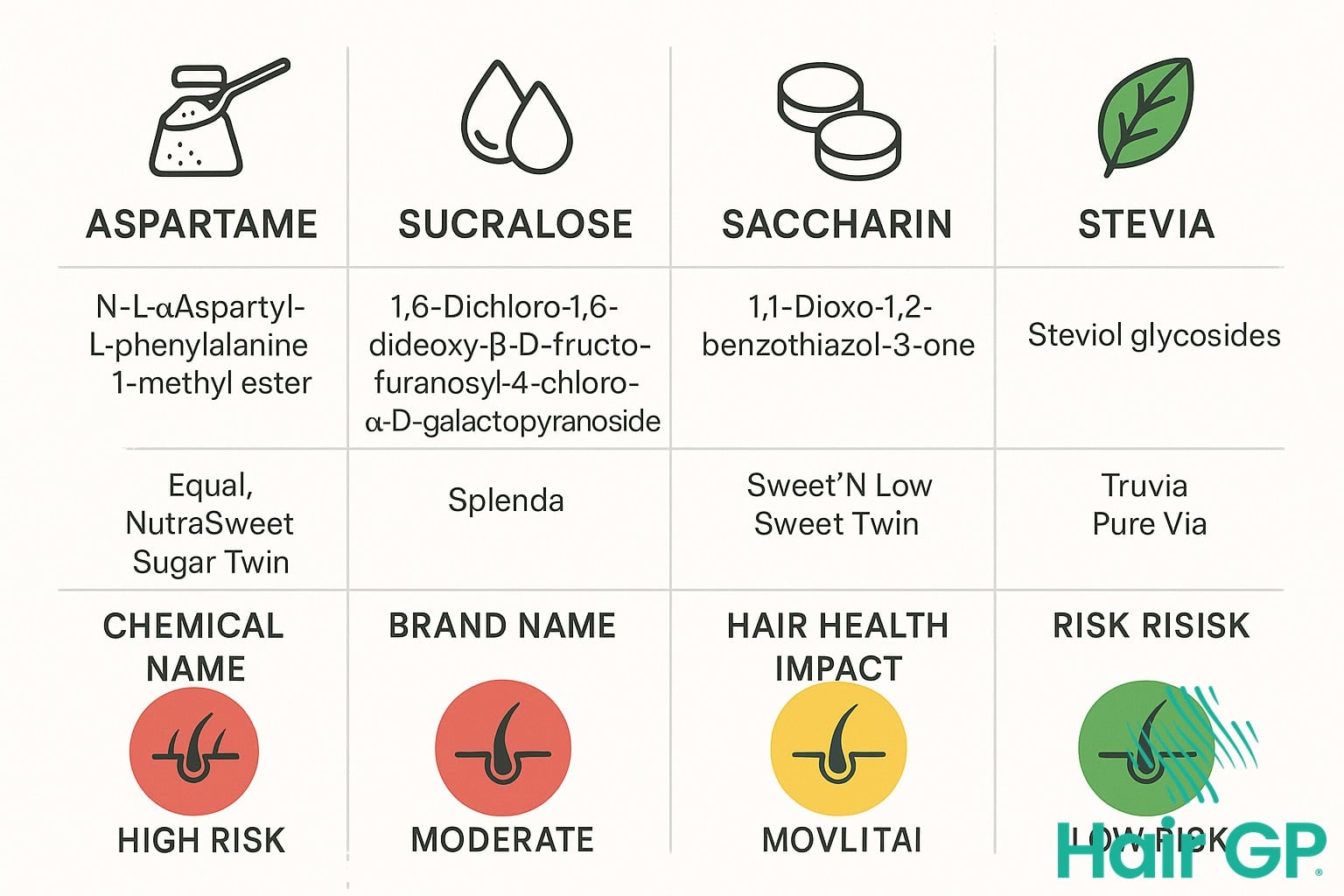
The Role of Diet in Hair Loss Prevention
Understanding the relationship between diet and hair loss reveals that what we eat significantly impacts our hair’s health and growth cycle. While artificial additives pose risks, embracing whole foods rich in essential nutrients can promote healthy hair growth and prevent unnecessary shedding.
Nutrients Essential for Hair Growth
Hair follicles require specific nutrients to maintain optimal function and growth. Biotin, a crucial B-complex vitamin, supports keratin production and strengthens hair structure [5]. Iron deficiency remains one of the most common nutritional causes of hair loss, particularly in women, as it’s essential for producing haemoglobin that carries oxygen to hair follicles. Zinc plays a vital role in protein synthesis and cell division within hair follicles, while omega-3 fatty acids nourish hair follicles and promote healthy hair growth by reducing inflammation and improving scalp circulation [6].
Foods to Avoid for Optimal Hair Health
Certain dietary choices can undermine hair health beyond artificial sweeteners. High added sugars intake triggers inflammation and glycation processes that damage hair follicles [7]. Fried foods and heavily processed items often lack essential nutrients whilst containing harmful trans fats that can disrupt hormone balance and impair nutrient absorption. Excessive caffeine consumption may interfere with iron absorption and stress the adrenal glands, potentially accelerating hair loss in susceptible individuals. Prioritising whole, nutrient-dense foods over processed alternatives supports both overall health and vibrant hair growth.
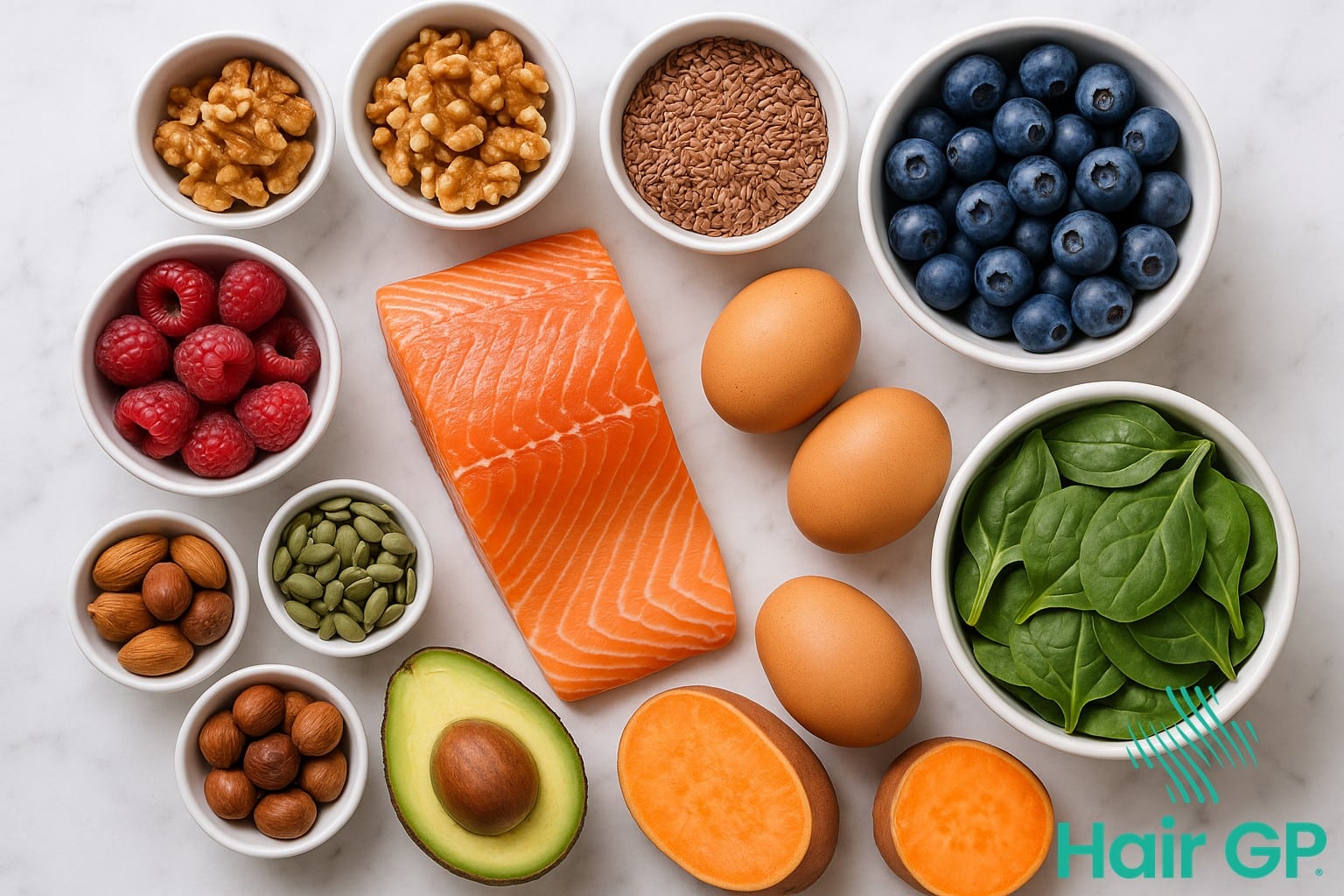
Natural Alternatives to Artificial Sweeteners
For those prioritising healthy hair whilst eliminating aspartame from their diets, numerous natural alternatives provide sweetness without compromising follicular health. Stevia, derived from the South American plant Stevia rebaudiana, offers zero-calorie sweetening without the potential metabolic disruptions associated with artificial additives. This natural extract has been used safely for centuries and provides sweetness up to 300 times that of sugar.
Whole food options present excellent alternatives for mindful sugar intake. Fresh fruits like dates, bananas, and applesauce naturally sweeten dishes whilst contributing beneficial nutrients that support hair growth, including vitamins, minerals, and antioxidants. Raw honey and pure maple syrup, though caloric, contain trace minerals and compounds that may benefit overall health when used sparingly.
Rather than replacing sugary foods with synthetic alternatives, consider gradually reducing overall sweetness preferences. Training your palate to appreciate less sweet foods helps break dependency cycles whilst supporting metabolic balance. Incorporating naturally sweet vegetables like roasted carrots and beetroot into meals provides subtle sweetness alongside hair-healthy nutrients, creating sustainable dietary patterns that support both general wellness and robust hair growth.
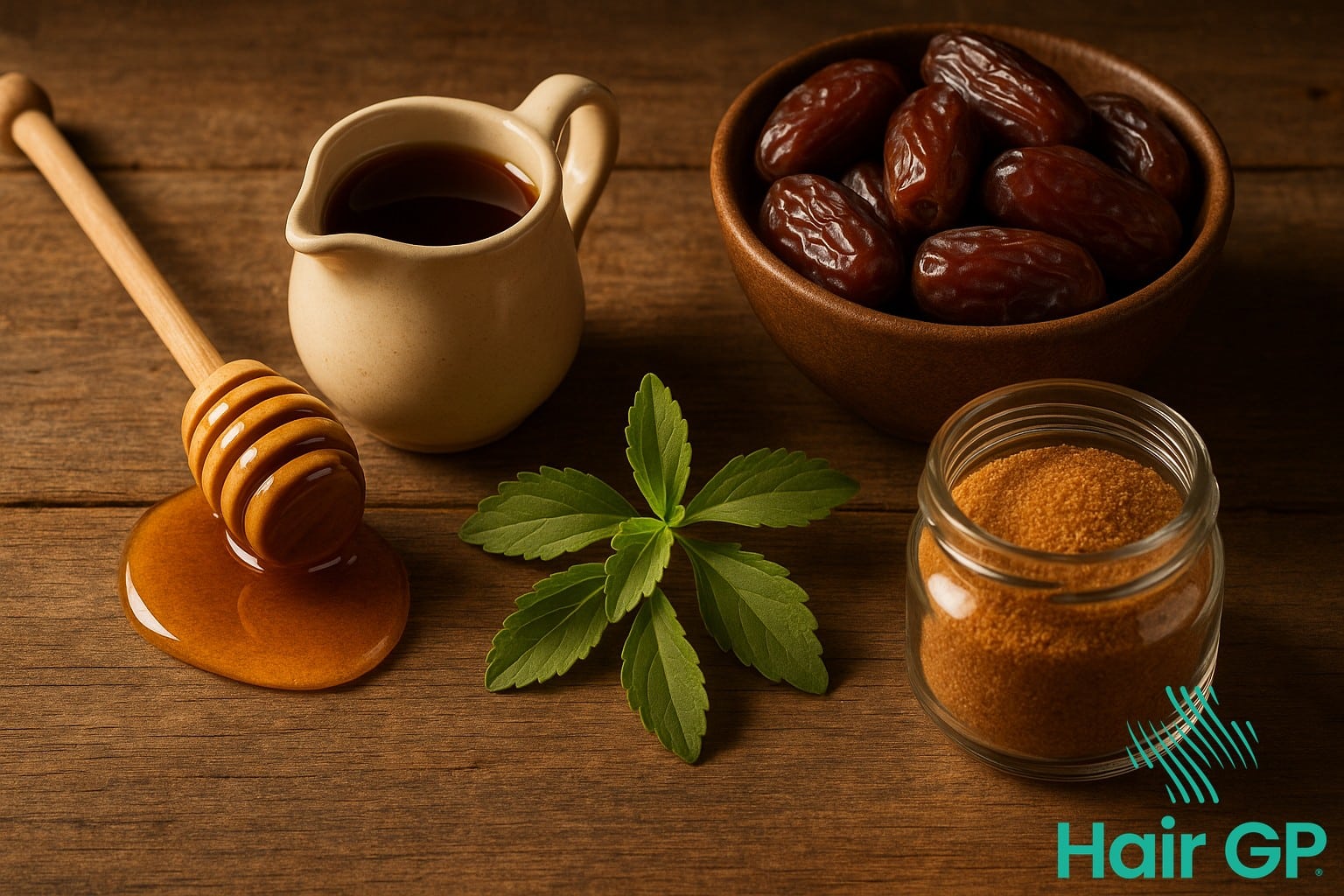
Treatment Options for Aspartame-Related Hair Loss
When addressing potential aspartame-related hair loss, comprehensive treatment begins with complete dietary elimination of artificial sweeteners. A systematic removal protocol spanning 8-12 weeks allows sufficient time to assess whether hair regrowth occurs naturally. During this elimination phase, maintaining detailed dietary records helps identify hidden sources of aspartame whilst monitoring changes in hair density and shedding patterns.
For individuals experiencing persistent hair loss, established medical treatments offer proven efficacy. Minoxidil, available in 2% and 5% topical formulations, demonstrates significant effectiveness for telogen effluvium recovery, with studies showing visible hair regrowth within 12-16 weeks of consistent application [8]. Finasteride, whilst primarily indicated for androgenetic alopecia, may support hair growth in select cases where hormonal factors contribute to thinning hairline regions.
Supportive therapies to promote hair growth include targeted nutritional supplementation addressing common deficiencies linked to hair loss. Iron, zinc, and vitamin D optimisation can enhance follicular recovery when combined with elimination protocols. Professional trichological assessment by a Specialist Hair Doctor helps determine appropriate treatment combinations, whilst scalp massage and low-level laser therapy may provide additional benefits. Timeline expectations for complete recovery typically range from 3-6 months following successful intervention [9], though individual responses vary considerably based on underlying causative factors.
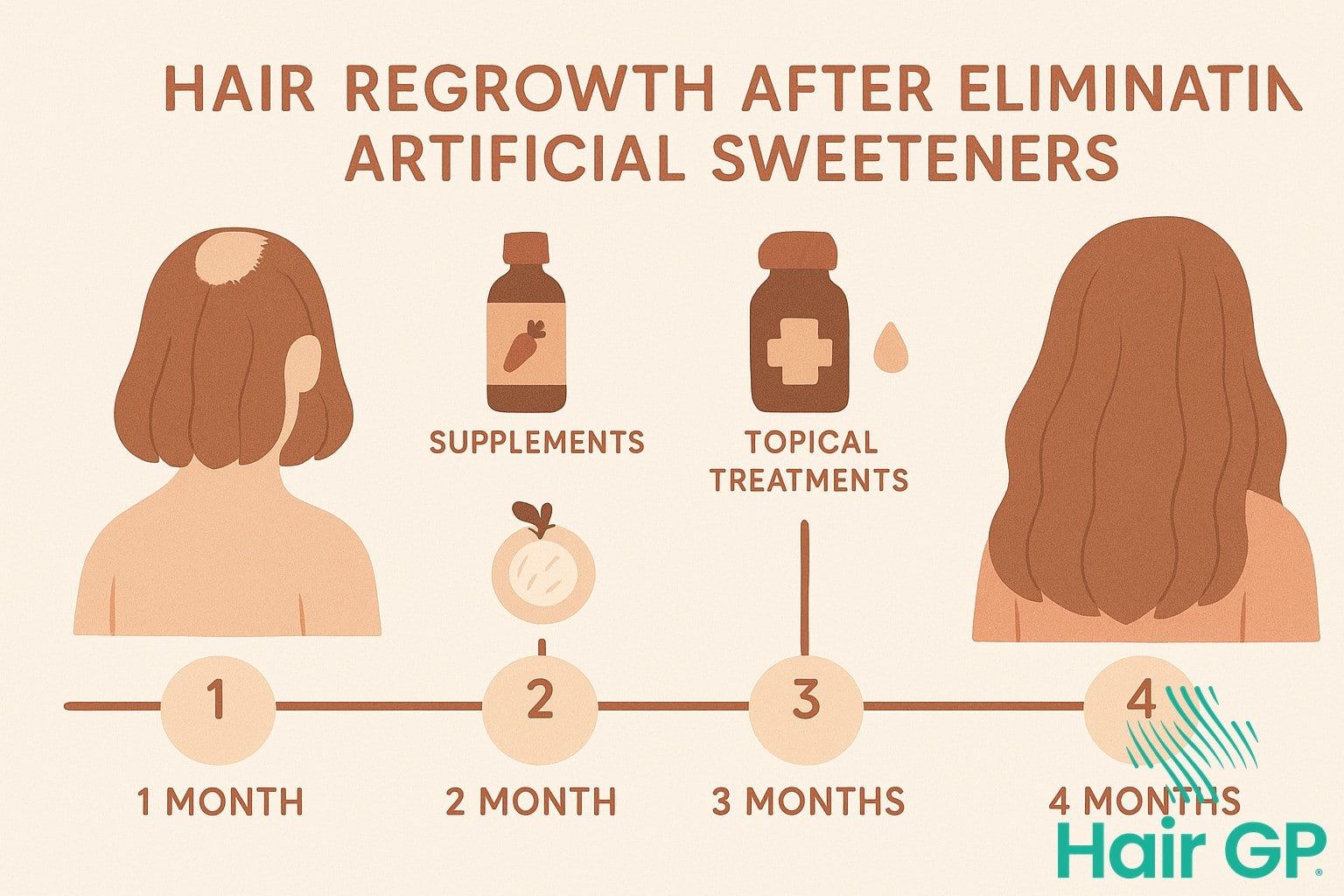
Conclusion
The evidence linking aspartame hair loss to various biological mechanisms presents a compelling case for dietary vigilance. Whilst individual responses vary, the potential for artificial sweeteners to compromise hair health through inflammation, oxidative stress, and nutrient depletion warrants serious consideration. By understanding these connections, individuals can make informed decisions to prevent hair loss before it becomes problematic.
Eliminating aspartame from your diet may prove beneficial for maintaining optimal follicle function and supporting healthy hair growth. Those experiencing unexplained hair thinning should consider evaluating their artificial sweetener consumption as part of a comprehensive approach to hair wellness. Natural alternatives like stevia, monk fruit, or moderate amounts of raw honey offer safer sweetening options without the associated risks.
To effectively prevent hair thinning, monitor your body’s response to dietary changes and document any improvements in hair density or texture after reducing aspartame intake. Remember that hair growth cycles span several months, so patience is essential when assessing results. By prioritising whole foods, maintaining adequate nutrition, and avoiding potentially harmful additives, you create an internal environment conducive to robust hair health and sustainable growth throughout your lifetime.
Frequently Asked Questions
Hair regrowth timelines vary by individual, but most people notice reduced shedding within 2-3 months of eliminating aspartame. New growth typically becomes visible after 3-6 months, as hair follicles need time to complete their growth cycle. Complete recovery may take 6-12 months, depending on the severity of hair loss and overall health factors.
In most cases, hair loss related to aspartame consumption is temporary and reversible. If aspartame triggers telogen effluvium or exacerbates inflammation, eliminating it from your diet typically allows hair follicles to recover. However, if you have underlying androgenetic alopecia, aspartame may accelerate the process, and some loss might be permanent without additional treatment.
While diet drinks are a significant source of aspartame, this artificial sweetener is found in over 6,000 products including sugar-free gum, low-calorie desserts, yogurts, breakfast cereals, and even some medications. Reading labels carefully is essential for complete elimination of aspartame from your diet.
Current evidence suggests that stevia, a natural plant-based sweetener, has the least impact on hair health. Monk fruit extract is another natural option with no known effects on hair. Among artificial options, sucralose appears to have fewer reported associations with hair loss compared to aspartame, though individual responses vary.
Yes, consulting a healthcare provider is recommended to rule out other causes of hair loss such as thyroid disorders, nutritional deficiencies, or autoimmune conditions. A dermatologist can perform tests to determine the type of hair loss and recommend appropriate treatments while you eliminate aspartame from your diet.
References
- Butchko HH, Stargel WW. Aspartame: scientific evaluation in the postmarketing period. Regul Toxicol Pharmacol. 2001. PMID: 11754527
- Magnuson BA, Burdock GA, Doull J, Kroes RM, Marsh GM, Pariza MW et al.. Aspartame: a safety evaluation based on current use levels, regulations, and toxicological and epidemiological studies. Crit Rev Toxicol. 2007. PMID: 17828671
- Ashok I, Sheeladevi R, Wankhar D. Acute effect of aspartame-induced oxidative stress in Wistar albino rat brain. J Biomed Res. 2015. PMID: 26445572
- Choudhary AK, Pretorius E. Revisiting the safety of aspartame. Nutr Rev. 2017. PMID: 28938797
- Almohanna HM, Ahmed AA, Tsatalis JP, Tosti A. The Role of Vitamins and Minerals in Hair Loss: A Review. Dermatol Ther (Heidelb). 2019. PMID: 30547302
- Guo EL, Katta R. Diet and hair loss: effects of nutrient deficiency and supplement use. Dermatol Pract Concept. 2017. PMID: 28243487
- Elizabeth L, Machado P, Zinöcker M, Baker P, Lawrence M. Ultra-Processed Foods and Health Outcomes: A Narrative Review. Nutrients. 2020. PMID: 32630022
- Messenger AG, Rundegren J. Minoxidil: mechanisms of action on hair growth. Br J Dermatol. 2004. PMID: 14996087
- Mubki T, Rudnicka L, Olszewska M, Shapiro J. Evaluation and diagnosis of the hair loss patient: part II. Trichoscopic and laboratory evaluations. J Am Acad Dermatol. 2014. PMID: 25128119

